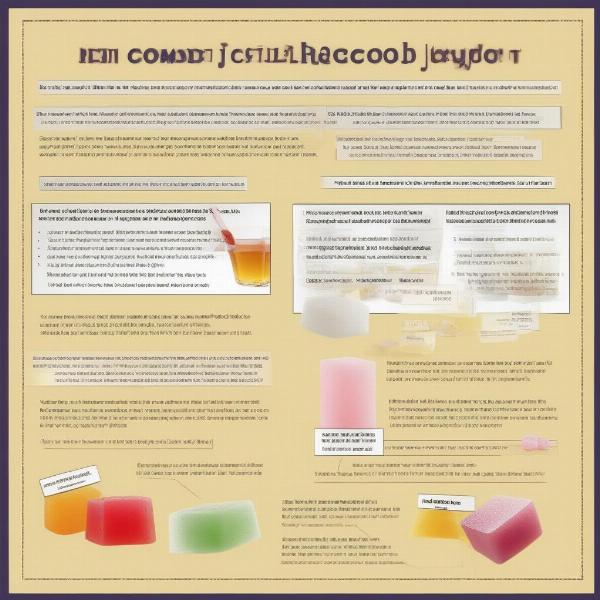Jello, that jiggly, colorful dessert, might seem like a harmless treat to share with your furry friend. But is jello bad for dogs? The short answer is: it depends. While plain gelatin isn’t inherently toxic, most commercial jello products contain ingredients that can be harmful to dogs, such as sugar, artificial sweeteners, and certain flavorings. Let’s delve deeper into the specifics of why jello can be problematic for dogs and explore safer alternatives.
Understanding the Risks of Jello for Dogs
While plain gelatin, the base of jello, is a protein derived from collagen and isn’t toxic to dogs, it offers no nutritional value. The real dangers lie in the added ingredients commonly found in commercial jello products.
Sugar and Artificial Sweeteners
Most jello brands are loaded with sugar, which can contribute to weight gain, dental problems, and even diabetes in dogs. Artificial sweeteners, particularly xylitol, pose an even greater threat. Xylitol is highly toxic to dogs, causing a rapid release of insulin, which can lead to liver failure and even death. Even small amounts of xylitol can be dangerous.
Artificial Flavors and Colors
Artificial flavors and colors in jello offer no nutritional benefits and can potentially trigger allergic reactions or digestive upset in some sensitive dogs. While these additives might not be immediately toxic, they’re best avoided.
 Jello Ingredients Harmful to Dogs
Jello Ingredients Harmful to Dogs
Can Dogs Eat Any Type of Jello?
As mentioned earlier, plain, unsweetened gelatin isn’t toxic to dogs. However, it’s crucial to ensure it’s truly plain, without any added sugars, sweeteners, flavors, or colors. Even sugar-free jello often contains xylitol, making it a dangerous choice.
Homemade Jello for Dogs: A Safer Option?
If you’re determined to give your dog a jello-like treat, making your own version at home using plain, unflavored gelatin and dog-friendly ingredients like fruit juice or bone broth can be a safer alternative. However, moderation is key. Even homemade jello should be an occasional treat, not a regular part of your dog’s diet.
What to Do If Your Dog Eats Jello
If your dog accidentally ingests a small amount of regular jello without xylitol, they might experience some mild digestive upset, but it’s unlikely to be life-threatening. Monitor them closely for any unusual symptoms. However, if the jello contains xylitol or if your dog consumes a large quantity, contact your veterinarian immediately. Time is of the essence in cases of xylitol poisoning.
Healthy Treat Alternatives for Dogs
Instead of jello, offer your dog healthy and nutritious treats like small pieces of fruits (apples, bananas, blueberries – avoiding grapes and raisins), vegetables (carrots, green beans), or commercially available dog treats made with natural ingredients.
Conclusion
While a small amount of plain, unsweetened gelatin isn’t harmful to dogs, regular jello is best avoided due to its added sugar, artificial sweeteners, and other potentially harmful ingredients. Prioritize your dog’s health by offering them nutritious treats and snacks specifically formulated for their dietary needs. Always consult with your veterinarian before introducing new foods into your dog’s diet.
FAQ
- Can dogs eat sugar-free jello? Absolutely not. Sugar-free jello often contains xylitol, a highly toxic artificial sweetener for dogs.
- What are the signs of xylitol poisoning in dogs? Signs include vomiting, weakness, lethargy, loss of coordination, seizures, and liver failure.
- Is gelatin good for dogs? Plain gelatin isn’t harmful, but it offers no substantial nutritional benefits.
- What are some healthy treat alternatives to jello? Fruits like apples and bananas (avoiding grapes and raisins), vegetables like carrots and green beans, and commercial dog treats with natural ingredients are good choices.
- What should I do if my dog eats jello with xylitol? Contact your veterinarian or an animal poison control center immediately.
Looking for More Dog Care Advice?
Check out these other helpful articles on ILM Dog:
ILM Dog is your trusted international resource for expert dog care advice. We offer a wealth of information on dog breeds, health, training, nutrition, grooming, and much more. From puppy care to senior dog care, we’re here to help you provide the best possible care for your canine companion. For more information, contact us at [email protected] or call us at +44 20-3965-8624. Visit ILM Dog for all your dog care needs!